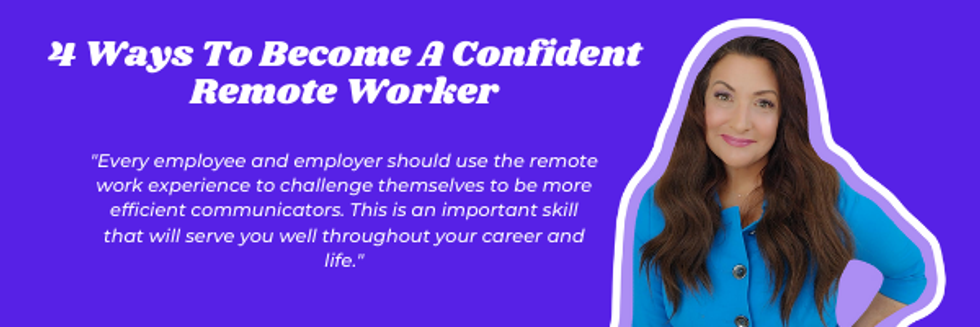It can be easy to assume that most workers are excited about the shift to remote work, but that's not the case for everyone.
Remote work has come as a major shock to some and the expansion of remote work opportunities may even have some professionals questioning their futures in the workforce.
A survey published in Forbes during the summer of 2020 indicated that 27% of employees were "Discouraged Employees" who do not like working from home. Those employees often cited long hours, more virtual meetings, and blurred lines between work and personal life as reasons for not enjoying the remote work experience.
None of this is really surprising because there's a large percentage of the workforce that came up at a time when many believed that work and home life weren't supposed to mix.
I understand the apprehension over the shift to remote work, but there are two important factors that all professionals need to consider moving forward:
- The number of companies offering remote work flexibility or going remote full time is only going to increase.
- Being afraid or trying to avoid remote work may limit career options moving forward.
Fortunately, there are also a lot of benefits to remote work, and if you're willing to adjust some habits, it's very possible to become a confident remote worker. Here are some ways to approach remote work and use it to your benefit.
Use Flexibility To Your Advantage

Bigstock
With some exceptions, most remote work positions come with schedule flexibility, where as long as certain deadlines are met and work gets done, managers don't hold workers to the typical 9-to-5 arrangement.
So, with this in mind, ask yourself, "When am I the most productive?" This is very similar to the advice that I give those trying to manage their job search schedule. For example, some workers try to schedule three to four hour blocks of time early in the morning to do work, leaving them a little extra time in the afternoon to deal with personal matters or enjoy an extra-long break.
If you can factor in your professional and personal needs, you can potentially build a schedule that works best. This may not happen overnight, so it's okay to try out different scheduling blocks and routines as you try to find out what works (as long as it also works for your employer).
Embrace The Opportunity To Become A Better Communicator

Bigstock
Remote work doesn't necessarily mean that you have to communicate more. It just means that you have to communicate better.
Most workers don't want to hop on multiple Zoom calls on a daily basis, but most also don't want to feel alone. It's about finding that communication balance that keeps you connected but doesn't take away from your work. If you're starting a remote job, be sure to get a list of the key people that you'll need to be in constant communication with and then work with them to put together a communication plan.
Depending on the profession, it may be possible to only have one weekly Zoom meeting and then communicate through channels like email, Slack, or other chat programs. Every employee and employer should use the remote work experience to challenge themselves to be more efficient communicators. This is an important skill that will serve you well throughout your career and life.
Bonus Tip: Professionals should also spend some time getting comfortable being on camera.
Invest Your Time Well

Bigstock
Just because you can access work 24/7 doesn't mean you should be putting in long hours every day. Every remote worker should do their best to stick to a normal workday. In fact, with remote work cutting out the need to commute, most professionals may have some extra time on their hands if they manage their time properly.
Take inventory of the additional time you gain from working remotely and invest that time back into yourself. This could include spending more time with family, focusing on a side hustle or passion, or taking online courses to upskill and grow professionally.
Some professionals view remote work as something that may add additional stress to their home lives, but if you're in a position to mitigate those stresses and create new and exciting opportunities, it completely changes your outlook on remote work and can help you achieve a better work-life balance.
Speaking of saving time...time is money! A June 2020 FlexJobs survey found that a remote worker could save about $4,000, by saving money on gas, car maintenance, new clothes, and food, to name a few expenses.
A little extra money can go a long way when investing in yourself.
Break Up The Daily Monotony
One of the big advantages of working remotely is that you can change things up now and then. Don't get me wrong, it's good to establish a stable routine and dedicated workspace the majority of the time, but routines can go stale.
With remote work, you have a lot more freedom to make changes that can positively impact your physical and mental well-being. It could be something like adding an exercise routine to break up your workday or having mid-day coffee dates with friends. A simple change in scenery for the day can also do wonders for your mood, whether it's enjoying the calm of your backyard or the hustle and bustle of a local coffee shop.
As long as you don't abuse this freedom, there are endless ways to recharge your mental battery during the workday.
As you can see from all of the above examples, there's an opportunity to turn every potential negative about remote work into a positive experience. This doesn't mean you have to work a full-time remote job in the future, but at the very least you can leave all of your options open in your next job search.




